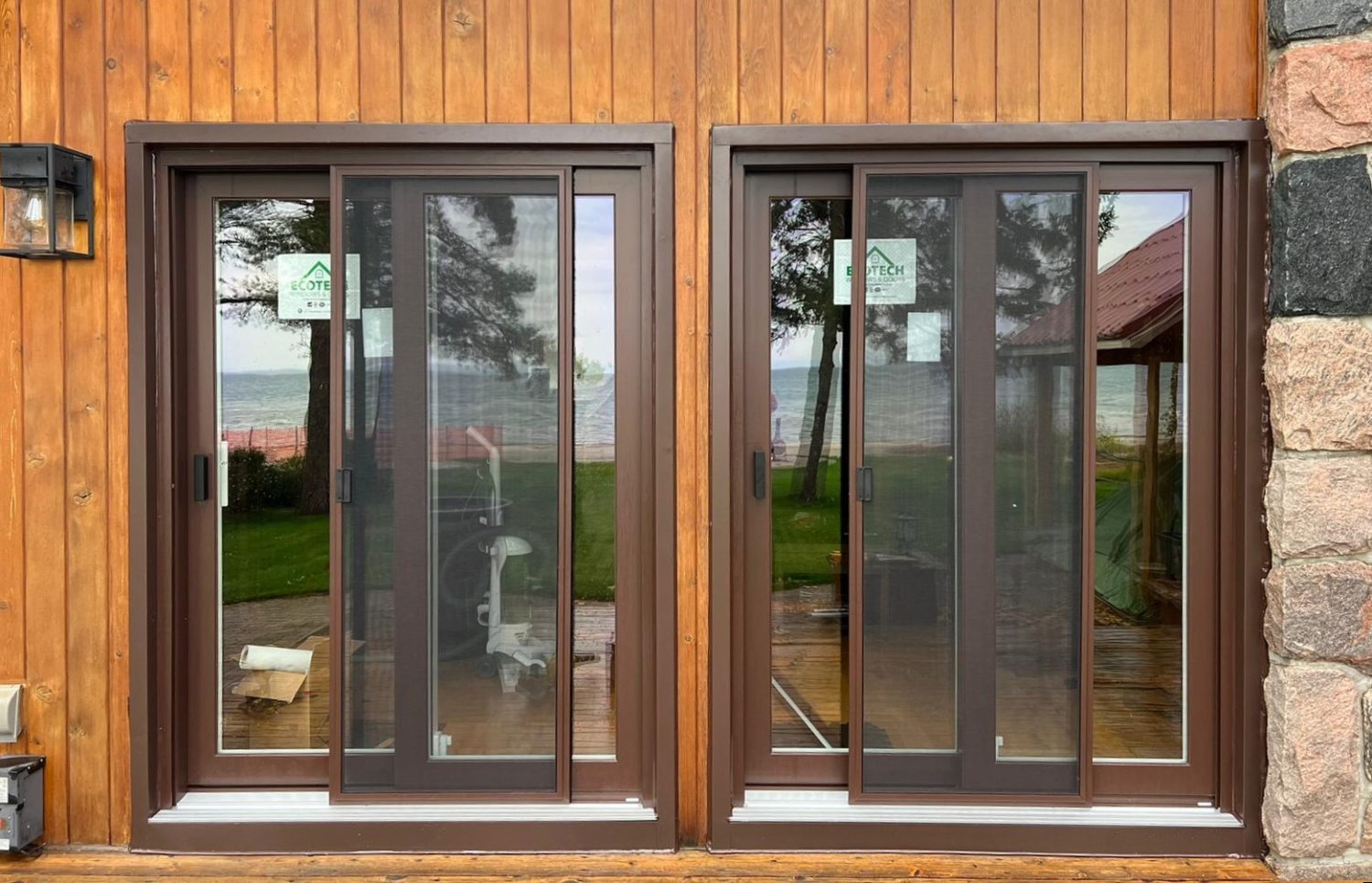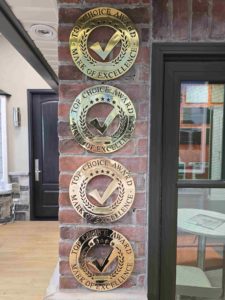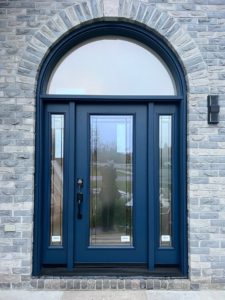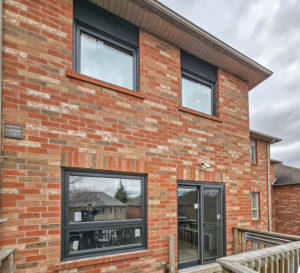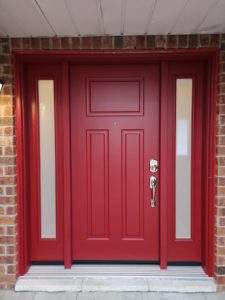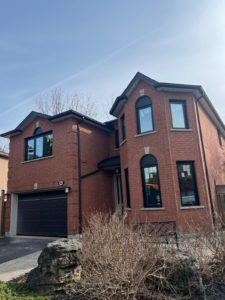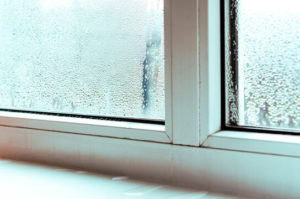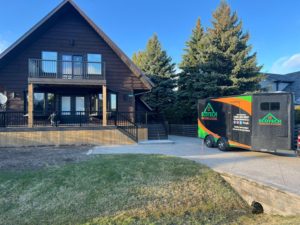In the ever-evolving realm of architectural design, sliding doors have emerged as a stylish and functional choice for modern spaces. With their sleek aesthetics and practical features, sliding doors have become an integral part of contemporary homes and commercial buildings. In this comprehensive guide, we will delve into the various aspects of sliding doors, from their fundamental features to the advantages and disadvantages they offer.
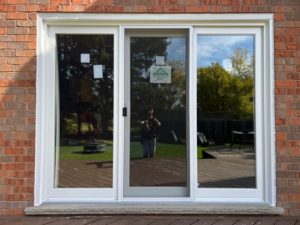
Picture Source – EcoTech Windows & Doors
What are Sliding Doors?
Definition and Construction
Sliding doors, as the name suggests, operate by gliding horizontally along a track. This unique mechanism distinguishes them from traditional hinged doors, providing a distinctive look and feel. Typically constructed with materials like glass, wood, or aluminum, sliding gates offer a blend of durability and aesthetic appeal.
Also Read: Sliding Glass Doors: The Ultimate Guide
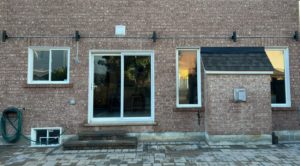
Picture Source – EcoTech Windows & Doors
What are the Features of Sliding Doors?
Sliding doors come with a range of features that contribute to their popularity in contemporary architecture. Let’s explore some of these standout characteristics:
1. Smooth Gliding Mechanisms
One primary feature that sets sliding doors apart is their smooth and effortless operation. The sliding mechanism, often using rollers or ball bearings, ensures that the gates move seamlessly along the track. This enhances user experience and adds a touch of luxury to the space.
2. Space-Saving Design
Unlike traditional gates that swing open, sliding doors operate parallel to the wall. This design choice is particularly advantageous in smaller spaces where the swing radius of a hinged door could be impractical. The space-saving attribute makes sliding gates an ideal solution for rooms with limited square footage.
3. Diverse Styles and Finishes
Sliding doors offer a wide array of styles and finishes to complement various architectural aesthetics. Whether you prefer a minimalist, modern look or a more classic design, sliding gates can be customized to suit your preferences. This versatility makes them a popular choice for both residential and commercial applications.
Also Read: Fiberglass Doors Installation: The Ultimate Guide
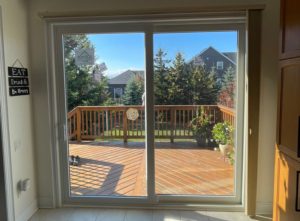
Picture Source – EcoTech Windows & Doors
What are the Advantages of Sliding Doors?
1. Abundance of Natural Light
One of the standout advantages of sliding doors is their ability to maximize natural light. The expansive glass panels allow sunlight to flood the interior, creating a bright and welcoming atmosphere. This not only reduces the need for artificial lighting during the day but also contributes to a more open and airier feel.
2. Seamless Indoor-Outdoor Transitions
Sliding doors are renowned for their ability to blur the boundaries between indoor and outdoor spaces. When opened, they create a fluid transition from the interior to the exterior, seamlessly connecting living spaces to patios, decks, or gardens. This feature is especially coveted in homes with scenic views or outdoor entertainment areas.
3. Enhanced Visual Appeal
The sleek and modern design of sliding doors adds a touch of sophistication to any space. The clean lines and unobstructed views offered by these doors contribute to a contemporary and visually appealing aesthetic. Whether used in residential living rooms or commercial office spaces, sliding doors can elevate the overall design of a place.
Also Read: Exterior Steel Doors with Glass: Enhancing Aesthetics and Functionality
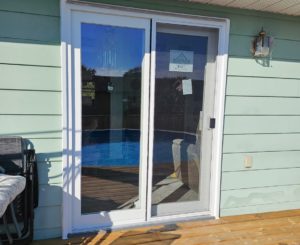
Picture Source – EcoTech Windows & Doors
What are the Disadvantages of Sliding Doors?
While sliding doors offer numerous advantages, it’s essential to consider potential drawbacks as well. Understanding the limitations can help in making informed decisions about whether sliding doors are the right choice for a particular setting.
1. Limited Insulation
One of the notable disadvantages of sliding doors is their potential for reduced insulation compared to traditional doors. The large glass panels, while allowing ample natural light, can also result in heat loss during colder months. Homeowners in regions with harsh winters may need to invest in energy-efficient glass or additional insulation to mitigate this issue.
2. Maintenance Challenges
The intricate sliding mechanisms, especially indoors with complex designs, may require regular maintenance to ensure smooth operation. Dust, debris, or wear and tear on the rollers can affect the functionality of the doors over time. Routine cleaning and lubrication are essential to prevent operational issues and extend the lifespan of sliding doors.
3. Security Concerns
The extensive use of glass in sliding doors, while aesthetically pleasing, can raise security concerns for some homeowners. Glass is perceived as more vulnerable to break-ins compared to solid materials. However, advancements in security technology, such as tempered or laminated glass and robust locking systems, have significantly improved the security of sliding doors.
Also Read: Sliding Patio Doors: Embracing Elegance and Functionality
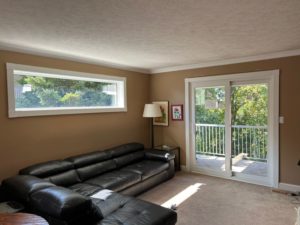
Picture Source – EcoTech Windows & Doors
How Much Does a Standard-Size Sliding Door Cost?
Understanding the cost implications is a crucial aspect of any home improvement project. The price of a sliding door can vary based on several factors, including material, size, and additional features. Let’s explore the typical cost range for standard-size sliding doors.
Factors Affecting Cost
1. Material
The material used in the construction of sliding doors significantly influences the overall cost. Common materials include:
Glass: Elegant and contemporary, glass sliding gates are often pricier due to the cost of the material and the precision required in manufacturing.
Wood: Wooden sliding doors exude warmth and classic charm. The cost can vary depending on the type of wood chosen, with hardwoods generally being more expensive than softwoods.
Aluminum: Lightweight and durable, aluminum sliding gates offer a modern look at a more budget-friendly price compared to some other materials.
2. Size
The size of the sliding door directly impacts the cost. Larger doors with more extensive glass panels generally cost more than smaller doors. Standard sizes are commonly available and are often more budget-friendly than custom sizes.
3. Additional Features
Optional features, such as energy-efficient glass, integrated blinds, or high-end hardware, can add to the overall cost. It’s essential to weigh the benefits of these features against their impact on the budget.
Typical Cost Range
As of November 15th, 2023, the average cost of a standard-size sliding door can range from $1,600 to $2,500 or more, depending on the factors mentioned above. It’s advisable to obtain quotes from multiple suppliers and consider both the initial investment and potential long-term energy savings when making a decision.
Also Read: Different Types of External Sliding Doors
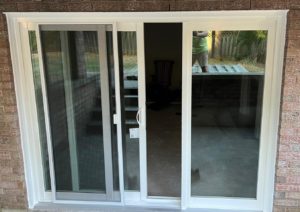
Picture Source – EcoTech Windows & Doors
Are Sliding Doors Cheaper than Regular Doors?
The cost of sliding doors compared to regular doors, such as hinged doors, is a common consideration for those embarking on a home improvement project. Let’s explore the cost dynamics between these two door types.
Cost Comparison
1. Initial Cost
In terms of initial purchase price, sliding gates can be more expensive than traditional hinged gates, especially if you opt for high-end materials or custom designs. The complexity of the sliding mechanism and the use of large glass panels contribute to the overall cost.
2. Installation Costs
Installation costs for sliding doors may be higher due to the precision required in fitting the tracks and ensuring the smooth operation of the sliding mechanism. Hinged doors, being more straightforward in design, often have lower installation costs.
3. Long-Term Savings
While the upfront cost of sliding gates may be higher, they can offer long-term savings in certain areas. The abundance of natural light they allow can reduce the need for artificial lighting, contributing to energy savings over time. Additionally, well-insulated sliding doors can enhance overall energy efficiency, potentially lowering heating and cooling costs.
Considerations for Decision-Making
When deciding between sliding gates and regular gates, it’s essential to consider both short-term budget constraints and long-term benefits. Factors such as aesthetic preferences, space considerations, and the desired functionality of the doors should also play a role in the decision-making process.
Also Read: Enbridge Home Efficiency Rebate Plus Program
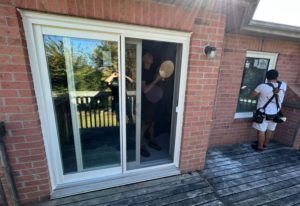
Picture Source – EcoTech Windows & Doors
Are Sliding Doors Better than Hinged Doors?
The choice between sliding gates and hinged gates often boils down to personal preferences and the specific requirements of a space. Each type of door has its own set of advantages and disadvantages. Let’s compare the two to help you make an informed decision.
Advantages of Sliding Doors over Hinged Doors
1. Space-Saving Design
Sliding gates are a clear winner when it comes to optimizing space. Their horizontal sliding mechanism eliminates the need for a swinging arc, making them ideal for areas with limited space or tight furniture arrangements.
2. Indoor-Outdoor Transitions
Sliding doors excel in creating seamless transitions between indoor and outdoor spaces. They effortlessly connect living areas to patios, balconies, or gardens, enhancing the overall flow of a space.
3. Modern Aesthetics
For those seeking a contemporary and sleek design, sliding gates often provide a more modern aesthetic compared to traditional hinged gates. The expansive glass panels and minimalistic frames contribute to an open and airy feel.
Advantages of Hinged Doors over Sliding Doors
1. Classic Design
Hinged doors, especially in traditional designs, can add a classic and timeless touch to a space. They are versatile and come in various styles, making them suitable for a range of architectural aesthetics.
2. Ease of Maintenance
Hinged doors typically have simpler mechanisms, leading to easier maintenance. Lubricating hinges and addressing any issues with the door’s swing are straightforward tasks, making hinged doors a practical choice for those who prioritize low-maintenance solutions.
3. Security
In terms of security, hinged doors are often perceived as more robust. Solid door materials and traditional locking mechanisms can provide a sense of security that some homeowners prioritize.
Considerations for Decision-Making
Ultimately, the choice between sliding doors and hinged doors depends on individual preferences, the specific needs of the space, and the desired aesthetic. Consider factors such as available space, architectural style, and the importance of features like indoor-outdoor connectivity when making your decision.
Also Read: Modern vs. Traditional Front Doors: Choose Your Style
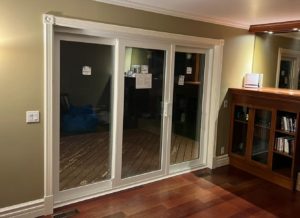
Picture Source – EcoTech Windows & Doors
Are Sliding Doors Good for Winter?
The performance of sliding doors in winter depends on several factors, including insulation, material choice, and the overall design. Let’s explore whether sliding gates are a suitable option for colder climates.
Insulation Considerations
1. Glass Type
The type of glass used in sliding doors plays a crucial role in insulation. Double or triple-pane glass with low emissivity coatings can significantly improve the door’s thermal efficiency. Low-E glass reflects heat into the room while allowing natural light to enter, contributing to both warmth and energy savings.
2. Frame Materials
The materials used in the door frame also impact insulation. While aluminum frames are lightweight and durable, they are not as insulating as materials like vinyl or wood. Homeowners in colder climates may prefer sliding doors with frames that offer better thermal performance.
Energy-Efficient Features
1. Weather Stripping
Well-designed sliding doors feature quality weather stripping to prevent drafts and heat loss. Regularly checking and replacing weather stripping as needed can ensure the continued effectiveness of this insulation feature.
2. Thermal Breaks
Some sliding gates come with thermal breaks in the frame, which are insulating barriers that reduce heat transfer. Doors with thermal breaks contribute to better energy efficiency and comfort in winter.
Additional Considerations
1. Professional Installation
Proper installation is crucial for the winter performance of sliding doors. A professional installer will ensure a tight fit, proper sealing, and correct placement to minimize heat loss.
2. Curtains or Blinds
Using curtains or blinds during colder months can provide an additional layer of insulation. Closing them at night or during the coldest parts of the day helps retain warmth indoors.
Conclusion
In conclusion, sliding doors can be suitable for winter use when equipped with proper insulation features and energy-efficient design elements. Homeowners in colder climates should carefully consider factors such as glass type, frame materials, and additional features to ensure that sliding gates contribute positively to energy efficiency and comfort during the winter months.
With more than twenty years of expertise, EcoTech Windows & Doors is a reliable supplier and installer of top-notch windows and doors. Our satisfied client base spans the entire province. Reach out to us now at (888) 880-6827 or conveniently fill out our online form to arrange a complimentary consultation with no obligations. Take the first step to enhance your home’s security, comfort, and aesthetic appeal today.


